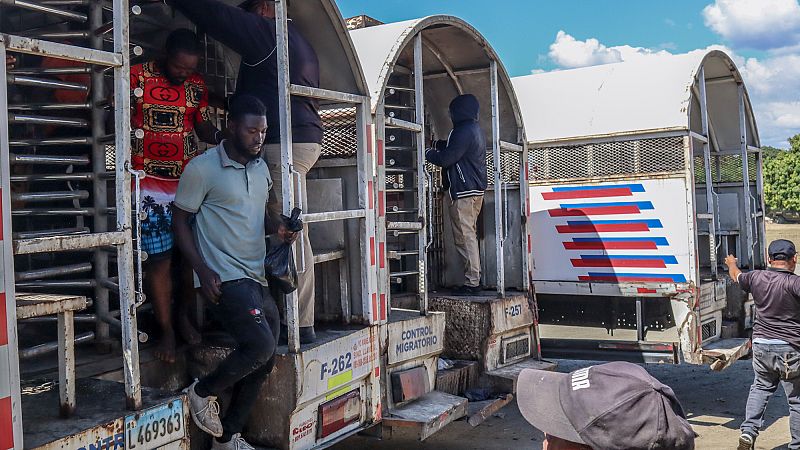Haitian migrants share harrowing stories of abuse in Dominican Republic

Over 500 people descended from dusty trucks on a recent morning and shuffled through a tiny gap in a border gate separating Haiti from the Dominican Republic.
They were the first deportees of the day, some still clad in work clothes and others barefoot as they lined up for food, water and medical care in the Haitian border city of Belladère before mulling their next move.
The Dominican government says Haitian migrants have overburdened public services, with more than 80,000 new Haitian students enrolled in schools in the past four years.
Meanwhile, health officials say Haitian women account for up to 70% of births in the country, costing the government millions of dollars.
Under a broiling sun, the migrants recounted what they said were mounting abuses by Dominican officials after President Luis Abinader ordered them in October to start deporting at least 10,000 immigrants a week under a harsh new policy widely criticized by civil organizations.
Activists say the number of alleged human rights violations ranging from unauthorized home raids to racial profiling to deporting breastfeeding mothers and unaccompanied minors is surging as officials ramp up deportations to Haiti, which shares the island of Hispaniola with the Dominican Republic.
More than a quarter million people were deported last year, and more than 31,200 in January alone.
Roudy Joseph, an activist who accused officials of ignoring due process during arrests, said the situation has reached a “critical point.”
Despite the crackdown, many re-enter the Dominican Republic, exposing a broken system.
That afternoon marked the second time Jimmy Milien, a 32-year-old floor installer, was deported.
He was arrested in the capital, Santo Domingo, in 2024 and again in mid-January when authorities boarded a public bus and pointed at him.
“Damn devil Haitian, get off,” he recalled them saying before they even asked for documents.
He left behind his wife and two children, ages 3 and 12, and doesn’t know when he’ll see them again.
Some of the deportees planned to travel to the Haitian capital of Port-au-Prince, but like thousands of other migrants dropped off in Belladère.
It means he would be forced to cross through gang-controlled territory where gunmen routinely order people off public buses or open fire on them.
In Haiti more than 5,600 people were reported killed last year, the majority by gangs that control 85% of the capital, Port-au-Prince.
Military checkpoints dot the main road that leads out of the dusty Dominican border town of Elías Piña.
Authorities board buses, stick their heads into car windows and detain suspected undocumented migrants, but many jump out before a checkpoint and hop on again further down the road.
Vice Admiral Luis Lee Ballester, Dominican migration director, denied abuse allegations but acknowledged officials are allowed to enter homes “during a hot pursuit” and that personnel are being retrained “because our commitment to respecting human rights is unquestionable.”
He also said it’s important that Haiti’s leaders instill order in their country and look after their people.
Ballester said the Dominican Republic does not deport unaccompanied minors and that officials now separate women and children from men during deportations.
But in late January, five teenagers without their parents were deported.
Further north, in the Haitian border town of Ouanaminthe, a 10-year-old unaccompanied girl was deported in late January, said Geeta Narayan, UNICEF’s representative in Haiti.
She noted that gangs along the border prey on them.
Last year, the Dominican Republic deported 1,099 unaccompanied children; 786 of them were reunited with their families, according to UNICEF.
Josette Jean, 45, feared for her 16-year-old son, who was born in the Dominican Republic, when he was recently deported alone to Haiti.
“The kid does not know where to go because he was born here in the Dominican Republic,” said Jean as she sat with her back to the camera because she was afraid to show her face.
Clutching a picture of him, she said she rushed to the Dominican detention center where he was being held, but was told the government doesn’t deport unaccompanied minors. He was deported anyway.
Jean paid a smuggler to bring her son back to the Dominican Republic days later.
A significant number of those deported, like Jean’s son, were born in the Dominican Republic, but lack birth certificates or other official documentation proving their legal status, with activists accusing the government of allowing work permits to expire or refusing to process their paperwork.
The Dominican Republic does not automatically give citizenship to everyone born there.
As mass deportations continue, President Abinader warned Haiti's situation is a danger to the region and that there could be an “uncontrollable wave of migration” as he called for more support for a U.N.-backed mission in Haiti struggling to fight gangs.
Today

